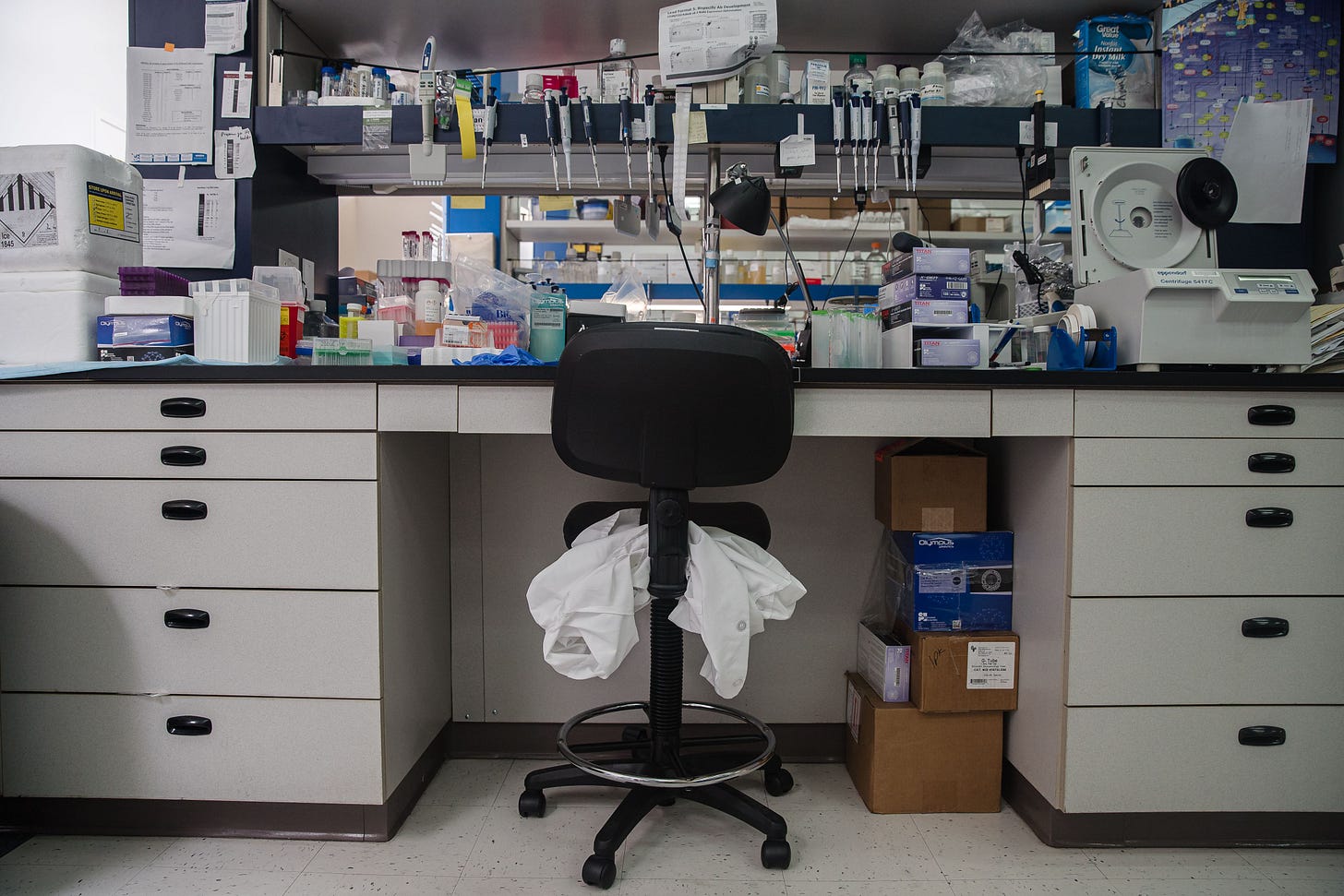Trump’s Latest Loyalty Test: Cancer Research Funding
Plus: The ol’ political two-face act
The Trump administration issued a new rule Friday that could upend the way universities, institutes, and research centers develop treatments and discover cures for disease. The plan to cap “indirect costs” (those used for administrative functions) in grants awarded by the National Institutes of Health (NIH) at 15 percent has started a low-grade panic among medical professionals and researchers.
A federal judge in Boston has already temporarily blocked the plan, but as with all of the new administration’s actions, this is only the beginning. Elon Musk has already decried it: “Judicially-mandated corruption!”
Some lawmakers are concerned about the cap; while others are applauding it as another way to combat wasteful government spending.
Fresh off voting to advance Robert F. Kennedy Jr.’s nomination to serve as secretary of health and human services through the committee stage, Sen. Bill Cassidy (R-La.) offered some cautious thoughts on the NIH’s new indirect cost cap.
“I heard from my people back home that it would be very difficult for universities in Louisiana to conduct this research” with such a cap in place, Cassidy said. “And of course I want research done for the sake of my people in Louisiana.”
Cassidy, who defended his RFK Jr. vote by saying he had secured commitments that the HHS nominee would show fidelity to science, added that he isn’t reconsidering his support. But some of his colleagues might—or they will at least feel the need to secure more “commitments” from Kennedy before his nomination goes to a floor vote likely later this week.
“I oppose the poorly conceived directive imposing an arbitrary cap on the indirect costs that are part of NIH grants and negotiated between the grant recipient and NIH,” Sen. Susan Collins (R-Maine) said in a statement. She added that universities have been informed that the spending caps “in some cases would apply retroactively to existing grants,” and that they “would be devastating, stopping vital biomedical research and leading to the loss of jobs.”
Collins said she also called Kennedy, who promised her he will “re-examine this initiative that was implemented prior to his confirmation” upon taking the reins at HHS.
Later in her statement, Collins noted that “Fiscal Year 2024 Appropriations legislation includes language that prohibits the use of funds to modify NIH indirect costs.” There’s no telling whether that applies to the retroactive spending caps she previously mentioned—or whether the current administration would even care.
While Collins highlighted the contributions that Maine universities have made to our understanding of Alzheimer’s and various tick-borne illnesses, NIH also funds many centers focusing specifically on pediatric care. The Boston Children’s Hospital received more than $200 million in NIH funds in FY2024. The Dana Farber Cancer Institute in Massachusetts received more than $164 million. The Cincinnati Children’s Hospital Medical Center in Ohio received a comparable $160 million. Children’s hospitals in Philadelphia, Seattle, and Memphis all received north of $100 million. In total, pediatric medical centers accounted for 31 of the organizations that received federal funding last year.
I asked Sen. Bernie Moreno (R-Ohio) for his thoughts on the prospect of children’s hospitals—two of which are in his home state1—facing financial hardship thanks to the spending cap directive. He didn’t balk at the idea or try to correct my facts. He welcomed the outcome.
“Well, I think what happens is the president is exactly right,” Moreno said. “I think if you ask the average American if we were spending a billion dollars to cure childhood cancer, how much of the billion dollars would go towards during childhood cancer? They’d probably say a billion. The idea that 60 percent goes to indirect cost and overhead is insane. And so I applaud the president.”
While Moreno clearly thinks funding for pediatric cancer research is an objectively good thing, his support for a cap on indirect costs would cripple that objective, advocates say.
The senator is sidestepping what it takes for these hospitals in the current climate to do medical research. Children’s hospitals have described administrative support as being critical to their ability to conduct the very research Moreno says he supports.
“The Administration’s new indirect cost guidelines will limit access to effective health care treatments and diagnostics for patients, and if implemented as currently drafted, will undermine our medical research capacity and put the nation’s health and global competitiveness at risk,” the Children’s Hospital Association said in a statement. “Reducing the indirect cost rate will threaten the ability of children’s hospitals to provide future groundbreaking cures for children.”
There is bloat in how much money the federal government spends on indirect costs. And the White House could, in theory, redirect the money they are saving in implementing these caps towards the actual research itself.
But the bloat is not as widespread as the White House alleges. And they have not said if they are going to redirect the savings back into research at all. As a result, they are threatening the critical fight against current diseases and the efforts to preempt future, unknown ones. Perhaps if this were better understood among Republican lawmakers, people like Moreno wouldn’t be so quick to applaud the administration for trying to excise wasteful spending with a chainsaw instead of a scalpel.
I believe in Harvey Dent
Yesterday, my colleague Sam Stein and I reported on the way many elected Republicans have been showing one face to the public and another to their constituents when it comes to DOGE. In response letters to inquiring constituents in their home states and districts, some Republicans who have publicly praised Elon Musk’s tinkering with sensitive government records and payment systems privately expressed concern and vigilance about establishing and limiting DOGE’s proper remit.
Republicans in Congress have widely praised Elon Musk as he’s gone about restructuring and in certain cases eliminating entire parts of the government.
But in private, they’ve expressed quite a different perspective on the head of DOGE and his wide-ranging initiative.
A review of letters sent by Republican members of Congress to their constituents shows many lawmakers expressing caution, even concern, about the role Musk is playing. Some members have pledged to voters that they will serve as a guardrail for DOGE. Others have expressed apprehension over the conflicts of interest that naturally result from the richest man on the planet—and a major government contractor—having such immense sway over federal spending. Even more have acknowledged fears that Musk may gain access to voters’ sensitive personal information. . . .
The constituent letters, a dozen of which were shared with The Bulwark by recipients, suggest that Musk is causing nascent discomfort and increasing political anxiety among Republican lawmakers. The billionaire Trump henchman has taken a howitzer to the federal government in the first few weeks of the Trump administration, virtually erasing some independent agencies (such as USAID), installing his own teams in many others, and waging high-pitched PR battles against anyone who would attempt to slow him down or put limits on his work.
Later in the day, I caught up with Sen. Deb Fischer (R-Neb.), who seemed taken aback when I informed her of the letter bearing her signature that one of her constituents provided to us. I showed it to her on my phone, and after she read it, she looked up at me and said, “I, uh, I, uh, don’t talk to you guys very much.” (By “us,” she meant the media.) “And I, uh, obviously respond to my constituents. If you want to print that, you’re welcome to do it.”
Nebraska is sending their best, I suppose. And she, in turn, is sending them all her best.
“Jeans represent democracy in fashion” -Giorgio Armani
If you read our topper and connected some sartorial and geographical dots, you might be wondering how it could be that there’s a thriving subculture of denim enthusiasts in the hot and humid climate of Vietnam. Lots of reasons, it turns out, including safety and—most importantly—style.
Denim is one of America’s greatest cultural exports. Like jazz music, rugged blue jeans are synonymous with American style. They’re a longstanding global phenomenon, one that has now found a new community of enthusiasts in Vietnam. In a new video posted by Stridewise, two Americans explored the denim scene in Ho Chi Minh City.
A quote from one of the Vietnamese denim enthusiasts stuck out to me. When asked how on Earth such a uniquely American product could be so popular in a country so horribly treated by the United States, he said:
I think the war is over. The hate is over. Right now, you can see a lot of American brands actually building their factories [in Vietnam].
Time heals all wounds. (It also gives great fades to raw denim.)
Watch the 13-minute mini documentary here.
These are the Cincinnati Children's Hospital Medical Center and the Research Institute at Nationwide Children’s Hospital in Columbus.







Emeritus Professor of Biology here, former recipient of NIH funding, and co-chair emeritus of one of NIH's study sections that reviews and scores grant proposals. Please stop referring to indirect costs as "administrative." Indirect costs are for FACILITIES and administration. Facilities like steam for the autoclaves, electricity for the lights, hazmat disposal, and safety training for lab personnel. Please also emphasize that indirect cost rates are NEGOTIATED between the research organization and the federal government. These negotiations require universities (in my case) to carefully and thoroughly document the ancillary costs of performing research.
Failing to pay the NEGOTIATED indirect costs is effectively a breach of contract.
Our research universities and national parks are the crown jewels of this country. Don't let Trusk touch either of them.
I don't know, Moreno. I think that you having staff is a waste of taxpayer money. I think you can do all your administrative, communication and research work yourself.